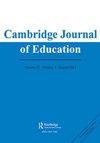多语言和学习模式对学生在高等教育中英语和其他科目成绩的影响
IF 1.5
3区 教育学
Q2 EDUCATION & EDUCATIONAL RESEARCH
引用次数: 0
摘要
摘要:学生的心态、多语性、学习风格和自我调节策略是他们学习模式的一部分,它们会以多种方式影响他们的学业成绩。本文介绍了一项研究的结果,该研究使用了一份185项的在线问卷,调查了191名法国本科生的心态、学习风格、自我调节策略、多语性和成绩之间的相互作用,这些本科生正在学习英语作为非语言学位的一部分。研究结果表明,对英语持有成长导向心态、将具体经验作为学习风格的一部分、精通多种语言的学生在英语学习中表现更好。同时,他们的心态、学习风格、自我调节策略或多语性与他们在非语言科目上的成绩之间没有统计学上的显著相关性。有趣的是,学生们报告说,他们在英语和非语言科目上都采用了相似的学习风格和自我调节策略。本文章由计算机程序翻译,如有差异,请以英文原文为准。
The impact of multilingualism and learning patterns on student achievement in English and other subjects in higher education
ABSTRACT Students’ mindsets, multilingualism, learning styles and self-regulation strategies, which represent parts of their learning patterns, can affect their academic achievement in various ways. This article presents the results of a study that utilised a 185-item online questionnaire to investigate the interplay among the mindsets, learning styles, self-regulation strategies, multilingualism and achievement of 191 undergraduate students in France who were studying English as a foreign language (EFL) as part of their non-language degrees. The findings indicated that students who held growth-oriented mindsets about EFL, used concrete experiences as part of their learning style, and were proficient in multiple languages performed better in EFL. At the same time, there were no statistically significant correlations between their mindsets, learning styles, self-regulation strategies or multilingualism and their achievement in non-language subjects. Interestingly, the students reported employing similar learning styles and self-regulation strategies for both EFL and non-language subjects.
求助全文
通过发布文献求助,成功后即可免费获取论文全文。
去求助
来源期刊

Cambridge Journal of Education
EDUCATION & EDUCATIONAL RESEARCH-
CiteScore
5.30
自引率
4.30%
发文量
35
期刊介绍:
Cambridge Journal of Education publishes original refereed articles on all aspects of education, with a particular emphasis on work that contributes to a shared understanding amongst academic researchers, theorists, practising teachers, policy-makers and educational administrators. The journal also welcomes the submission of systematic review articles that summarise and offer new insights into specific areas of educational concern. With a wide international readership, Cambridge Journal of Education publishes contributions drawn from different educational systems and cultures enabling continued in-depth discussion of global educational theory, policy and practice. The journal’s Special Issue programme encourages and stimulates focused discussion and engagement with significant themes and responses to topics raised by readers and contributors. Cambridge Journal of Education welcomes proposals for future editions.
 求助内容:
求助内容: 应助结果提醒方式:
应助结果提醒方式:


